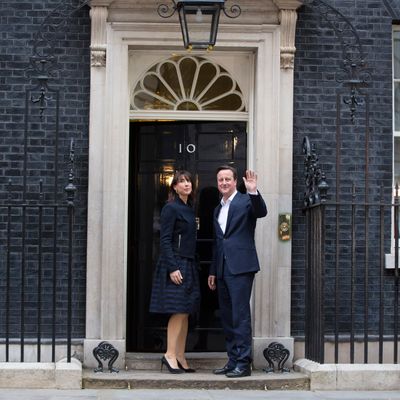
After weeks of polling that suggested the Conservative and Labour parties were locked in a tight race, an exit poll released just after voting ended in the U.K. on Thursday night showed a shocking result: The Tories would win 316 of Parliament’s 650 seats, with Labour taking just 239. “If this exit poll is right, I will publicly eat my hat,” Paddy Ashdown, the former leader of the Liberal Democrats, said on live TV. (The poll also predicted his party would be decimated.) Later fellow commentator Alastair Campbell, Tony Blair’s former spokesman, said if the Scottish National party actually won 58 of Scotland’s 59 seats, he’d eat his kilt.
By Friday morning, BBC viewers were owed one hat eating, and they only narrowly missed seeing a kilt in the mix. While the results are still being tallied, it appears that the Conservatives will at least come close to winning a majority in Parliament. “This is clearly a very strong night for the Conservative Party,” said Prime Minister David Cameron, who will stay in the office he’s held for the past five years. “Some people say — in fact I’ve often said — that there’s only one opinion poll that counts, and that’s the one on election day,” he added. “And I’m not sure that’s ever been truer than it is today and tonight.”
The results were a massive blow to Labour and its leader, Ed Miliband, who last week was the slight favorite to become prime minister. Instead, Labour lost at least 24 seats in its worst night since 1987. Miliband stepped down as Labour leader on Friday. “I take absolute and total responsibility for the result,” he said. The leaders of the Liberal Democrats and the U.K. Independence Party — Nick Clegg and Nigel Farage, respectively — also both stepped down.
“This has clearly been a very disappointing and difficult night for the Labour Party,” Miliband said. “We haven’t made the gains that we’d wanted in England and Wales and in Scotland we have seen a surge of nationalism overwhelm our party.” (Some say Americans are less dignified than the Brits, but at least we didn’t make Mitt Romney deliver his concession speech while a guy in a gigantic novelty hat stood behind him and laughed.)
The Liberal Democrat party, which has been the junior partner in the ruling Conservative coalition, suffered a crushing defeat as well. The party lost 45 seats, including those of four members who served as ministers in the coalition government. “It is now painfully clear that this has been a cruel and punishing night for the Liberal Democrats,” said Clegg, who served as deputy prime minister.
Meanwhile, the Scottish National Party had its best U.K. election night ever. The party was expected to perform well, and it wound up with 56 of Scotland’s 59 seats, which will make it the third-largest party in Parliament. The region has traditionally been a stronghold for Labour, winning 41 out of 59 Scottish seats in the 2010 election. Last year Scotland voted to remain in the U.K., but rather than marking the end of the party backing the split, that vote fueled the rise of the SNP. According to the Washington Post, Labour was done in by its support for keeping the union intact and a feeling that Scotland was being neglected by party leaders. “What we’re seeing tonight is Scotland voting to put its trust in the SNP to make Scotland’s voice heard, a clear voice for an end to austerity, better public services and more progressive politics at Westminster,” said SNP leader Nicola Sturgeon.
Cameron’s office said he will visit Queen Elizabeth II on Friday, presumably to tell her he has enough support to form a government. As the Telegraph’s James Kirkup writes, Thursday’s election result means he’s heading into his second term facing two huge existential questions: “Will the United Kingdom survive in its current form? And will the U.K. remain a member of the European Union?” SNP’s massive success means it’s likely we’ll see another vote on Scottish independence, or at least greater autonomy for Scotland. And Cameron has promised to hold a referendum by the end of 2017 on whether Britain should remain in the European Union.
“We should never in politics duck the big issues, whether it’s dealing with our deficit, whether it is holding that referendum which we were right to hold, on the future of Scotland in the United Kingdom, or indeed in the future that referendum that we must hold to decide Britain’s future in Europe,” Cameron told supporters on Thursday.






























